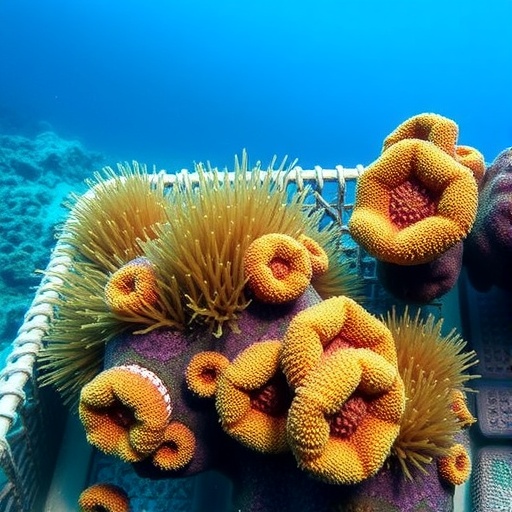With the alarming rate of coral bleaching occuring worldwide, UC Riverside scientists have initiated a groundbreaking project aimed at understanding the recovery of corals after they undergo severe environmental stress, particularly from heat. This ambitious undertaking has garnered a notable investment of $1.1 million from both the National Science Foundation and the Paul G. Allen Family Foundation. The project is a response to the worrying trend of coral reefs losing their vibrant colors and essential symbiotic algae, leading to their eventual demise, leaving behind lifeless skeletons.
Corals, which are critically important to marine ecosystems, rely heavily on the presence of algae within their tissues. These algae, known as zooxanthellae, provide essential nutrients through photosynthesis, contributing to the corals’ energy and health. When corals experience thermal stress, often exacerbated by climate change, they expel these algae in a process known as bleaching. The result is a stark white appearance that signifies not just a loss of color but a dire situation for the coral that remains vulnerable to starvation and disease.
A pivotal aspect of this research is to probe into how coral–algal relationships recover after a bleaching event. The project leader, Tingting Xiang, an assistant professor of bioengineering at UCR, underscored the significant knowledge gaps that exist regarding the recovery process. Understanding how these essential symbiotic relationships can be reinstated after stress will provide insights into potential intervention strategies that could aid in the survival of coral reefs.
The exploratory timeline for this three-year project includes advanced imaging techniques as well as innovative experimental systems designed to observe cellular behavior when algae successfully recolonize the bleached reefs. One intriguing approach the researchers plan to implement involves using sea anemones as an alternative model for corals—allowing real-time observation of colored algae as they reintegrate into the anemone host after being subjected to stress. This observational technique aims to provide fine cellular details regarding the reintegration process and the dynamics involved at the microscopic level.
Working closely with computational modeler Jia Gou, an assistant professor of mathematics at UCR, the team will develop simulations to help predict the growth patterns of algae once they recolonize coral hosts. These models are crucial for visualizing and understanding the physiological responses of corals as they reintegrate algae into their tissues, a process that holds the key to their survival during prolonged warming events.
In addition to these methodologies, the project sets out to decipher the genetic and cellular pathways that govern the processes involved in algae reestablishment. Identifying these critical pathways could illuminate the biological mechanisms behind coral resilience and recovery. By examining gene expression and regulation, researchers hope to pinpoint specific targets that can be manipulated to enhance coral recovery.
But the project’s focus is not confined to mere academic exploration; it is also driven by a practical application component. The team aims to translate their scientific discoveries into actionable tools that can be utilized to support the recovery processes of compromised corals in real-world environments. Collaborating with chemical and environmental engineer Robert Jinkerson, this applied aspect represents an exciting frontier in coral restoration science, with the ultimate goal of fostering resilient coral populations.
Coral reefs, despite encompassing less than 1% of the ocean floor, play a vital role in sustaining nearly 25% of all known marine species. They also serve as natural buffers against storm surges and shoreline erosion, besides being crucial for industries dependent on tourism and fishing. However, these precious ecosystems are under severe threat, having lost approximately 14% of their live coral cover between 2009 and 2018, according to estimates from the United Nations. As such, the ongoing global coral bleaching events are not only an ecological crisis but an economic one, with the total estimated value of coral reefs reaching nearly $10 trillion.
Through this integrated approach to studying the reestablishment of algae in bleached corals, Xiang and her research team aim not only to expand the pool of fundamental scientific knowledge but also to pave the way for practical conservation tools. By stabilizing and potentially revitalizing coral populations, they hope to contribute to the resilience of coral reefs against the relentless impacts of climate change.
The project’s visionary outcome underscores a broader commitment to ecosystem health and sustainability in the face of unprecedented anthropogenic pressures. While the road ahead may be fraught with challenges, Xiang’s work represents a beacon of hope that systems can be rebuilt even in the face of intense adversity—a testament to the adaptability of life in our oceans.
Ultimately, as the project progresses, it will be imperative not only to monitor the short-term results but also to understand long-term implications for coral health and resurgence. This study could shape the future of coral conservation strategies, offering innovative approaches to mitigate the effects of climate change on these invaluable ecosystems. Through interdisciplinary collaboration and dedication to science, the prospects for saving our coral reefs could be more promising than ever before.
In conclusion, the urgency of addressing coral bleaching cannot be overstated, and this groundbreaking research project embodies an optimistic stride towards understanding and mitigating the effects of climate change on these essential marine ecosystems. As scientists continue to unravel the complexities surrounding coral recovery, the hope remains that with knowledge and innovation, sustainable solutions can emerge to preserve the vibrant life forms that inhabit our oceans for generations to come.
Subject of Research: Coral recovery mechanisms and restoration strategies.
Article Title: Understanding Coral Recovery: A $1.1 Million Quest to Save Bleached Reefs
News Publication Date: October 2023
Web References: N/A
References: N/A
Image Credits: Tingting Xiang/UCR
Keywords
Coral, Coral bleaching, Coral reefs, Reef building corals, Aquatic animals, Climate change, Abrupt climate change, Anthropogenic climate change, Climate change effects, Climate change mitigation, Ocean temperature, Ocean warming, Ocean surface temperature.




